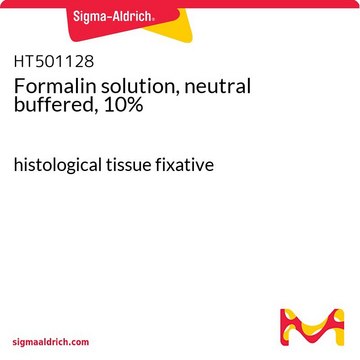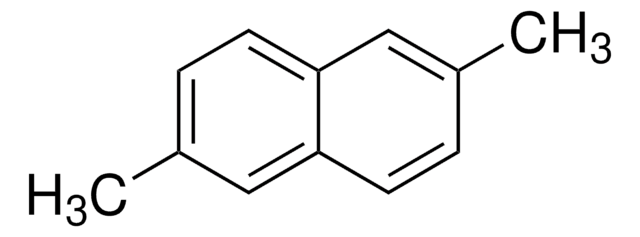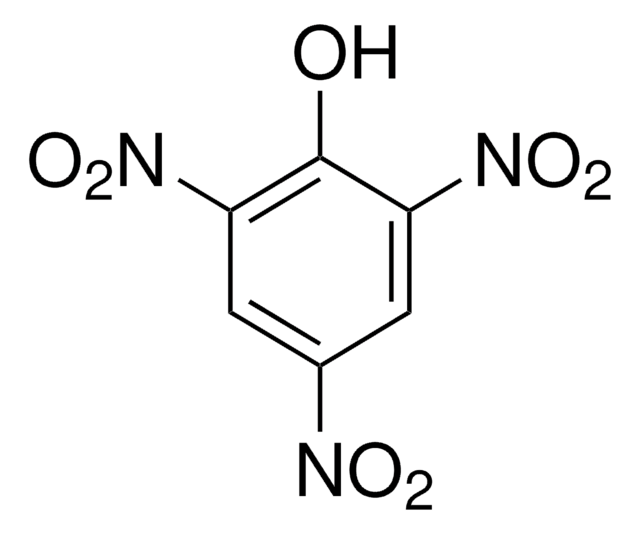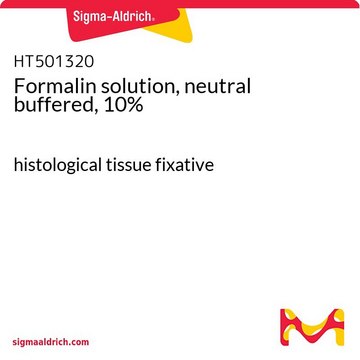F5304
Formalin, 10%, Neutral Buffered with 0.03% Eosin
Sign Into View Organizational & Contract Pricing
All Photos(1)
About This Item
UNSPSC Code:
12352202
Recommended Products
shelf life
Expiry date on the label.
color
pink
pH
6.90-7.10
density
1.080 g/cm3
application(s)
hematology
histology
storage temp.
room temp
Application
Intended for use as general histological fixative. The addition of the eosin to the formulation allows the user to more easily visualize small fragments of tissue during the transfer of the tissue from the fixative to the tissue cassette.
Signal Word
Danger
Hazard Statements
Precautionary Statements
Hazard Classifications
Acute Tox. 4 Inhalation - Acute Tox. 4 Oral - Carc. 1B - Muta. 2 - Skin Sens. 1
WGK
WGK 3
Personal Protective Equipment
dust mask type N95 (US), Eyeshields, Gloves
Choose from one of the most recent versions:
Already Own This Product?
Find documentation for the products that you have recently purchased in the Document Library.
Customers Also Viewed
A method to estimate the formaldehyde concentration in fixative solutions
Simos P
Oral Diseases, 43, 394-394 (2011)
Ran Xie et al.
The journal of histochemistry and cytochemistry : official journal of the Histochemistry Society, 59(4), 356-365 (2011-03-18)
The loss of antigenicity in archival formalin-fixed paraffin-embedded (FFPE) tissue sections negatively affects both diagnostic histopathology and advanced molecular studies. The mechanisms underlying antigenicity loss in FFPE tissues remain unclear. The authors hypothesize that water is a crucial contributor to
Hannelore Kothmaier et al.
Archives of pathology & laboratory medicine, 135(6), 744-752 (2011-06-03)
Formalin-fixed, paraffin-embedded tissue is the routine processing method for diagnostics practiced in pathology departments worldwide. To determine the potential value of non-cross-linking, formalin-free tissue fixation for diagnostics in pathology and proteomic investigations. We tested 3 commercially available, formalin-free tissue fixatives-FineFIX
Anil Sebastian et al.
The Journal of investigative dermatology, 137(3), 737-747 (2016-11-20)
Electrical stimulation (ES) is known to promote cutaneous healing; however, its ability to regulate reinnervation remains unclear. First, we show that ES treatment of human acute cutaneous wounds (n = 40) increased reinnervation. Next, to define neurophysiologic mechanisms through which ES
A Pragmatic Approach to Formalin Safety in Anatomical Pathology
A Pragmatic Approach to Formalin Safety in Anatomical Pathology
Laboratory Medicine, 40, 740-740 (2009)
Our team of scientists has experience in all areas of research including Life Science, Material Science, Chemical Synthesis, Chromatography, Analytical and many others.
Contact Technical Service









